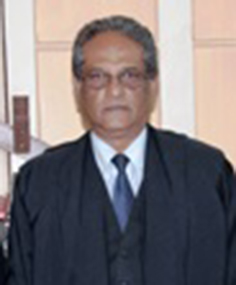After his first year in office as Chairman of Police Complaints Authority (PCA) Justice William Ramlal reported open abuse of the constitution by “a substantial number” of police officers under investigation, including the wrongful arrests of members of the public and unlawful searches.
“The [PCA’s] investigations have revealed that arrest of citizens, including minors, for summary conviction offences were quite frequently unlawful and where lawful, have been unnecessary. The Police should be made aware that such arrest amounts to misconduct contrary to Section 4(1) of the Police (Discipline) Act…,” Ramlal states in the PCA’s report for 2019, which was recently circulated in the National Assembly.
According to the report, 276 complaints were closed for that year after preliminary investigation, with 27 more pending investigations. For that year as well, three complaints were referred to the Commissioner of Police, while five were sent to the Director of Public Prosecution (DPP).
Ramlal, who was sworn in as Chairman in 2018, notes that in his report for that same year, he had reported that the police continued to infringe the fundamental rights of citizens on a regular basis. He adds that while he had recommended that recruits and members of the force be educated about the rights of citizens, there hadn’t been any significant change.
“For 2019, I interviewed a few hundred members of the Force covering all ranks, except the Commissioner of Police, and all of them [have] shown poor knowledge of the Force Standing Orders, the law and its applications in criminal matters, the fundamental rights of every citizen, the power of arrest with or without an arrest warrant, what amounts to reasonable suspicion, what amounts to an arbitrary stop and search and what are the rules governing the principles of fairness,” Ramlal states, while adding that the state of affairs negatively impacts the work of the PCA and the force.
Addressing the arrest and detention of members of the public for non arrestable offences (where there is no custodial sentence), he points out that Article 139 of the Constitution provides the protection of the right to personal liberty. As a result, in every case where there is an arrest and detention of a citizen for a non arrestable offence, the member of the force responsible is committing a disciplinary offence and making the state liable to pay damages and compensation for false imprisonment.
He also cites the arrest and detention of members of the public based on unlawful stop and search exercises, where there is no reasonable suspicion for such. Similarly, he notes the invasion of citizens’ homes, including unlawful searches, by police ranks under the pretext of carrying out a search for a “firearm” and “narcotics.” The law requires an Inspector to be present for such searches or a lower rank who is in charge of the nearest police station but Ramlal says his investigations had found that such searches were being carried out in open violation of the law, which would amount to misconduct
‘Flagrant disregard’
The PCA is the only independent body vested with the powers to investigate complaints against the police, although Ramlal highlights that the Force was still investigating matters under the Authority’s statutory purview.
He notes that four matters involving the fatal shooting of citizens were referred to the PCA in 2019 for him to write a report, inclusive of recommendations, but it was impossible for him as he did not supervise the investigations as is required by the law. He says the Police Force continued to “flagrantly disregard” the Police Complaints Authority Act by investigating such cases, making itself a judge in its own case.
Ramlal adds that the then Commissioner of Police was violating the Act by failing to seek the PCA’s comments as to whether any charges of misconduct should be instituted against any member of the force. He further says that the then Commissioner further violated the legislation by not seeking the PCA’s comments prior to the imposition of any penalty on any member of the Force. “The Commissioner has never contacted or consulted the Authority on any of these matters and the Commissioner is statutorily obligated/mandated to do so,” he notes in the report.
He also points out that some complaints under the PCA’s purview are made to the Office of Professional Responsibility, which lacked the legal mandate to investigate them.
Additionally, Ramlal’s report voices concern over instances where members of the force were criminally charged but remained on active duty rather than being interdicted in keeping with the Force’s Standing Orders. He notes that he has also learnt that some of those charged have settled the respective cases with the complainants. “Surely if these criminal matters were lawfully settled or lawfully concluded there still remains the institution of disciplinary charges against such members of the Force. In other words the Police [are] saying that there is more than enough evidence to institute criminal charges but once these charges are concluded in favour of the specific ranks then this is enough to forgo the disciplinary charges. This would be patently wrong,” he says.





